False Pretences
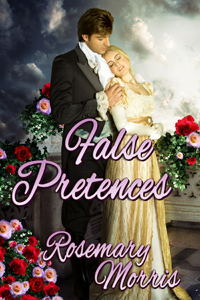
A Delightfully Twisty Read.
Review by
Rochelle Weber, Roses & Thorns.
I shy away from historical romance because I absolutely hate anomalies—things like the use of modern jargon in period pieces. But this book was a Christmas gift, and I’m familiar with Ms. Morris, so I thought I’d give it a try. I’m so glad I did. As you can see, I found no anomalies and no modern jargon.
Annabelle is eighteen when she runs away from school on the eve of her wedding to a much older man. A handsome stranger named Roland rescues her from highwaymen and identifies himself as her fiancé. When they spend the night in separate rooms at an inn, she’s so innocent, she doesn’t understand why he wants the innkeeper’s daughter to sleep in her room as a chaperone. Not having a mother to talk with her on the night before her wedding, she has no clue what sex is, and she remains innocent until her wedding night. The next morning, they encounter a truly odious man whom she dubs “The Toad.” She later learns he is really her fiancé.
Annabelle also worries that her status as an orphan may compromise Roland’s social standing. She’s heard the girls at school speculate that she may have been born “on the wrong side of the blanket.” And then she learns from the woman Roland hired as her ladies’ maid that there are kidnapping charges pending and a reward posted as a result of her disappearance from school. The maid tries to blackmail her, but Annabelle runs away hoping to find out who her birth parents are, who her guardian is, and why they wanted her to marry “The Toad.” She also hopes to persuade them to allow her to stay married to Roland, the man she loves.
A Delicious Romp
Review by Maggi Anderson
by Best-Selling Australian Historical Romance Novelist.
Again, I found no glitches in this tale. The characters were well-drawn, and I rooted for them from beginning to end. Even when Roland lied to Annabelle, I always knew he did so to protect her, not to deceive. It was a page-burning mystery that I had difficulty putting down, and a truly delightful read. I enjoy the historical accuracy in Rosemary Morris’ novels. This one is no exception; the exquisite details are a delight. Feisty, adventurous heroine, Annabelle Allan, yearns to discover who her guardian is. With only a dim memory of a French lady who left her at The Beeches, a school for young ladies, Annabelle runs away when she is told she is to marry a stranger, an older man with a rakish reputation. This charming story lives up to its title, False Pretences, and we remain unsure who anyone is, including the gorgeous hero, until near the end of the story when the mystery is revealed. Despite the lack of explicit detail in the sex scenes, there is an unceasing, delicious frisson between the hero and heroine throughout.
SUNDAY’S CHILD
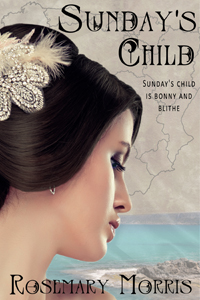
Heroines Born on Different Days of the Week, Book 1
A well-written romance
Review By
Janet Glaser
Author Rosemary Morris whisks us away in this historical romance to the Regency times in England. Life was so different for women in the early 1800’s than the 21st century even for those who come from privileged families. The culture of finding a rich husband during the “season” in London and the pressure to marry well was uppermost in the minds of the well-to-do families. Morris’ well-written story is rich in vivid details of the time–the outstanding description of clothing, the settings, and the culture of civility and purity. If you are a reader of historical romance, be sure to read the first in the series of the Heroines Born on Different Days
A Sprightly Regency Romance
Review by
Lindsay Townsend multi-published author
When Georgianne, the appealing, enterprising heroine of ‘Sunday’s Child’ first encounters Rupert Tarrant, she is fourteen. Georgianne thinks even then the tall, blond handsome soldier is the kind of man she hopes to marry one day.
At seventeen, when they meet again, Georgianne is in mourning for her brothers and father, lost in the Napoleonic wars. She is now wary of becoming romantically involved with a military man, despite the limited life that an unmarried woman is forced to lead in the 1800s.
However, as the novel superbly shows, a young woman without a father or brother to protect her interests is vulnerable to predatory males. None is more predatory than Lord Pennington, a truly odious Earl, whose relentless pursuit of Georgianne is aided by the conventions and morals of the time.
Rupert Tarrant meanwhile is haunted by the violent death of his betrothed and is torn between remaining single to grieve and marrying to provide an heir to his recently acquired estate.
That Georgianne and Tarrant should marry – she for protection, he for an heir – seems an ideal compromise. But what chance is there for love to grow between them?
This is a flowing romance, full of intrigue and incident, with rich details of Regency fashion, food and furniture. There are frost fairs and Nabobs, Lord Byron’s poetry, kidnappers and ruffians, attempted blackmail and a heroine who can shoot.
The whole convenient marriage trope is treated with tender realism. With their careful treatment of each other and their striving to understand their differing experiences, Georgianne and Tarrant thoroughly deserve their eventual happy ever after.
MONDAY’S CHILD
Heroines Born on Different Days of the Week, Book 2
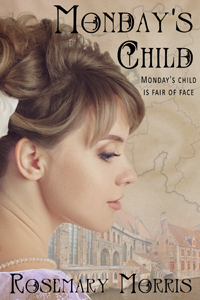
Excellent. Impeccably researched Regency.
Review by
Patsy
Helen is a charming, talented young woman, madly in love with the handsome Viscount Langley. Living in Brussels with her sister and husband the 18-year-old Helen awaits a proposal from the man who has captured her heart.
Unfortunately, when Langley arrives after visiting his family home, he has not come to offer marriage to Helen, but to break her young heart, for he learned that the estate in England has been nigh on ruined by his gambling father and now most of the family treasures must be auctioned off to pay his debts, which means Langley is expected to marry an heiress, which sadly Helen is not.
Set against a troubled background when the Battle of Waterloo is looming, this is a charming Regency showing Society life with all its stifling unwritten rules of etiquette when a lady is expected to marry a man who is spotted merely kissing her hand in public—how times have changed! The dashing Captain Dalrymple is set on marrying her, and Helen is not short of other suitors, but pines for her one true love that she cannot have. A lady must marry in those times or face a future as a governess or companion to some crotchety old lady. There are other sub-plots entwined in this tale that are enough to hold your interest. Definitely one for Regency fans
Regency Addicts Rejoice
Review by
Juliet Waldron Historical Novelist
Everything for the Regency addict here, with a heroine of great beauty but small fortune, all the strategies required for keeping one’s place in the “ton,” and plenty of interfering relatives. Taking it a little further afield than Jane Austen did, this story is set in 1815 Brussels where all the eligible young men are soldiers in Wellington’s army, awaiting an attack by Napoleon. Despite the wartime tension, there’s still plenty of time for balls, visiting, and morning gallops. The author knows her stuff–from clothes, to the many strictures of proper behaviour, which seem to us today as limiting as the ladies’ underwear. Not only the detail but dialogue too shows a lively understanding of the period; I didn’t see a single teacup laid out of place. While this book is a Regency delight, it’s no fantasy confection. Class differences and gender relationships are portrayed realistically, sometimes jarringly so, with no candy-coating. I was particularly pleased by the marital choice made by Monday’s Child–aptly named “Helen.” It left me with no doubt about her HEA.
Tuesday’s Child
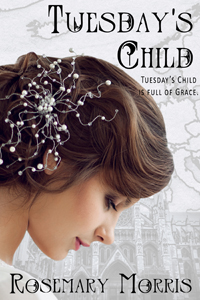
Tuesday’s Child is Full of Grace
Review by
Robbi Perna Ph.D. – Author and Lecturer
And, for Harriet Stanton, she is grace under pressure. Left widowed during the Napoleonic War, which also killed her father, the destitute heroine turns to Georgianne Tarrant for help. Georgianne introduces her to her late husband’s father, the obnoxious Earl of Pennington, who accepts this “mere baronet’s daughter” into his home. His action is far from altruistic for Harriet brings him a precious gift—her son, Arthur. The child gives the old Earl the heir he desires to replace the detested distant kinsman who currently fills that role. Morris’s knack of creating realistic characters, both likeable and not so much, is again in the forefront of the story. Her heroine is not a member of the haute ton and the hero who is, has a surprising occupation. This third book in the Heroines Born on Different Days of the Week series is the latest in an engaging set of tales that provides readers with an intriguing glimpse into the lives of people with whom they can identify. Even the time-honoured plot of the lost heir has a surprising twist. I highly recommend the book for those of us who need to escape our 21st century lives and catch another peek of a fascinating period of history.
A Regency Mother’s Dilemma
Review by
Anta Davison
Ms Morris paints delightful and credible portraits of the unyielding Earl of Pennington and the delightful Harriett, who wants a less indulgent childhood for her son. However, she is torn between gratitude to her father-in-law and insistence Arthur does not grow up to be indulged and entitled. To complicate her life, she also has the growing affection of Dominic, the handsome bachelor vicar to deal with as she too begins to return his regard.
Wednesday’s Child
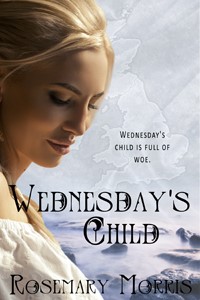
Wednesday’s Child is full of woe
A joy to read
Review by
Mrs Jennifer Black
When Mrs Bettismore died in 1816, her last words to her granddaughter were “there is something I should have told you.” It means nothing to Amelia at the time, but comes to haunt her later. Raised in the old lady’s strict household, she inherits her grandmother’s fortune, but is unprepared for life on her own.
However, her farsighted grandmother appointed Saunton as initially unwilling guardian and his noisy household of widowed mother and loving sisters is a total shock to Amelia. The idea of joining in Christmas games and going riding in the snow terrifies her. This young lady is far from the madcap heroines of some Regency novels, but Amelia is strong-willed in many ways and it is a pleasure to read of her steady acceptance of a different way of life.
The author’s grasp of the manners of the time is impressive and details of Amelia’s clothes and fashionable surroundings are never overdone. All are neatly woven into a truly delightful story with light touches of humour sprinkled throughout. A joy to read!
A Delightful Addition to the Series.
Review by
Anita Davison
Ms Morris cleverly ties in her characters from each of her Heroines Born on Different Days of the Week Regency Series, each of which transports the reader right into the period with authentic manners, customs and the restrictive way of life females were expected to lead in early 19th century England. Polite society was a minefield for girls, where a misstep could throw not only them, but their entire family, to the wolves, putting siblings constantly at risk of social ruin.
This latest in the series is the story of Amelia, left wealthy but bereft who finds herself thrown into her new guardian’s rumbustious family of girls who show their new companion a different way of living. The spirit of Amelia’s grandmother is always there to remind her of what she shouldn’t do, but Amelia slowly learns that maybe the irrepressible Mrs Bettismore not only didn’t have all the answers, but harboured secrets too.
The author’s style is gentle and charming, with lovely descriptions and a worthy hero in Amelia’s long-suffering guardian, Saunton, who goes the extra mile to protect all his womenfolk, some of whom are more of a trial than othe
Tangled Love
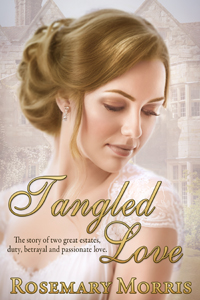
Romance and Betrayal in the Early Eighteenth Century
Review by
Diana Scott Lewis
After the death of her father, Juliana and her little sister are threatened with being disinherited by their scoundrel of a half-brother. Juliana sends her sister to a safe place and travels to London to consult her father’s lawyer. Apparently, there are two wills, and her brother holds the second one. Was it legally written?
Gervaise, a handsome and mysterious man who once lived in India, pities the beautiful young woman and volunteers to help. He’s mourning the loss of his Indian wife but can’t stop his attraction to Juliana.
Juliana isn’t sure she can trust this dashing stranger but she’s determined to obtain what she N Ms. Morris envelopes us in the early 18th century, a time of turmoil over who is the true heir to the throne of England. The clash of Catholics and Protestants. Gervaise comes on too strong very quickly, but the author makes it work by giving him an aura of decency. The story moves at a good pace and is a nice blend of history and humour.
Far Beyond Rubies

Far Beyond Rubies is a Gem
Review by
N.N. Light
“Swounds, he thought, I am expected to marry and produce a male heir. An image of Juliana filled his mind. She would grace these ancient walls better than any other lady he knew. But what would she say when he revealed his past?”
This is but a snippet of the delightful prose found in Far Beyond Rubies by Rosemary Morris. The author perfectly achieves the delicate balance of elegance and spice, humour and pathos, in this tale that takes place in England during the reign of Queen Anne.
The settings and characters are exquisitely detailed and described, from cruel and scheming relatives to determined orphans, and an unusual hero with mysteries of the orient in his silky, spicy past. Throw in some extremely amusing servants and landladies, and one is set for a thoroughly charming reading experience.
Rosemary goes beyond the mere surface of the era, rewarding the reader with an enchanting story set against a vivid backdrop of the of the culture, politics, and belief systems of the times, and the issues that developed when East met West: Fascinating. Lovingly and beautifully rendered throughout.
A Superb Page Turner
Review by
SIL
Rosemary Morris has crafted a superb novel set in the Queen Anne time-period in London. The historical details are accurately researched and artfully presented, making excellent use of vivid sensory details. Further, the characters spring to life, each fully moulded into his or her unique personality.
Bound by a childhood promise made to her father, protagonist Richelda faces tough challenges nearly a decade later. Poor and now orphaned, she dreams of a better future with all the trappings of the good life. But, to keep her promise, she must regain the ancestral home, Field House, which is said to contain hidden treasure. Her vow to her father is sealed by a ruby ring that she wears on a chain around her neck–a constant reminder of her promise.
Dudley, her childhood sweetheart, plus the charismatic Viscount Lord Chesney, her suitor in an arranged marriage by her wealthy aunt, set the stage for Richelda’s doubts and uncertainties. Dudley won her heart years earlier, but is he all that he appears to be? Chesney, on the other hand, is the owner of Field House and could offer her the life she dreams about in her ancestral home. Further, Aunt Isobel has promised to make Richelda her heiress on the condition she does indeed marry Lord Chesney. Yet are her push-pull feelings for Chesney strong enough to merit a marriage vow? Throughout the story, Richelda never disappoints. She is spirited, fiercely independent, sweet, and loving–truly a three-dimensional character.
Author Rosemary Morris takes her readers gently by the hand and leads them down a highly entertaining pathway filled with love, intrigue, deceit, and mystery. Highly recommended. A 5 Star winner!
Wonderful Historical Romance
Review by
Kate Gardener
“In this tale of duty, honour and betrayal, Rosemary Morris evokes the sights, the sounds, the smells of 17th century London. The gorgeous clothes, the food and drink, and the manners of the day are perfectly researched and help bring the story to vibrant life”. Richelda is a spirited and likeable heroine who, bound by an oath she made as a child, must make her way through a tangle of dramatic events to find the happiness she deserves. This is a wonderful read. I urge you to buy it.
‘Tangled Love’ has a loveable heroine in Richelda and a commanding hero. Throughout their time together they share many adventures and Richelda must mature a little, learn to see who she can trust and who is worthy of her love. Can she rely on her childhood sweetheart Dudley or the worldly Alban? Her choice is important, a matter of life and death.
Set during a time of religious turmoil in England, ‘Tangled Love’ is a worthy historical novel as well as a fast-paced romance. Through its pages the reader learns of the social and divisions of faith during the time of Queen Anne and is shown the very limited destinies available to women at the time. There is also a mystery here concerning possible secret, hidden treasure and a lively sub-plot involving a second romance between two of the subsidiary characters
This is a well-written story, full of twists and turns. The romance is at all times realistic and shown from both the heroine’s and hero’s POV, something I always enjoy. Overall the novel is almost Gothic at times, with its secret priest holes, treasure, family obligations and secrets and its dangerous, unstable villain.
Very enjoyable!
The Lovages of Cassio
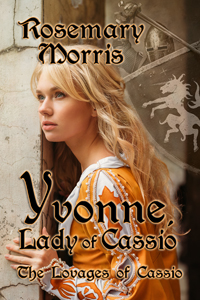
Volume One
Yvonne, Lady of Cassio
Beautifully Plotted. Sudden Death and Passionate Love
Review by
Jennifer’s Review:Vine Voice
I so much enjoyed this new novel by Rosemary Morris. I am a convinced fan and enjoyed her previous books, set in the time around the Napoleonic Wars.
This is something really quite different, a story that takes place in 13th century England. Five generations after the Norman conquest, bitterness and hatred still reigns between the Norman lord and the Saxon families who previously owned the Cassio estates.
The complex story line follows men and women of both noble and peasant birth with equal empathy, and includes relevant historical topics such as a belief in witchcraft, the rights of the manorial seigneur, sudden death, violence and passionate love.
I particularly enjoyed Morris’ compassionate observation of the relationships between those characters who shouldn’t necessarily be having one. There is love, duty, colour and historical accuracy in this novel.
None of Morris’ novels are heavy on eroticism or violence. This one is a little more plainly spoken than her others – I think it suits the period.
I loved it and couldn’t put it down all weekend.

